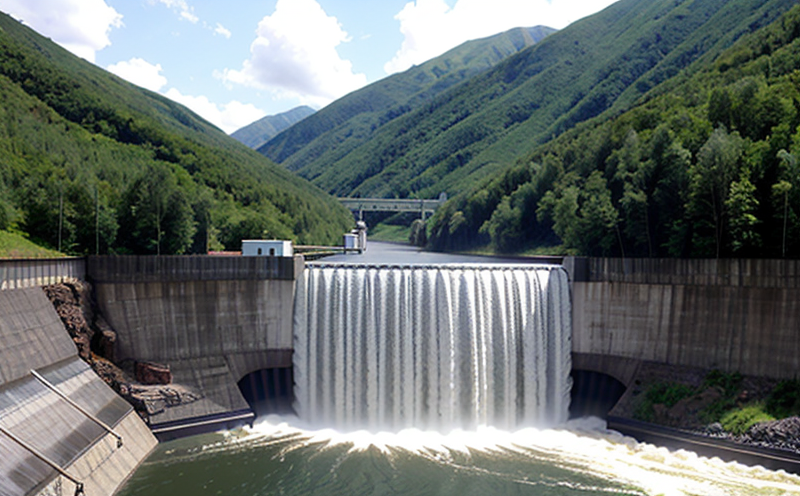EN ISO 15614 Weld Procedure Qualification Testing in Turbine Systems
The European standard EN ISO 15614-1:2009 provides a framework for the qualification and evaluation of welding procedures used in the manufacturing of pressure equipment, including turbine systems. This service is critical to ensuring that welds meet the stringent quality requirements set by this standard.
The primary purpose of Weld Procedure Qualification Testing (WPQT) as per EN ISO 15614-1:2009 is to verify the capability of a welding procedure in producing high-quality joints that meet specified performance criteria. This testing is essential for ensuring compliance with the relevant codes and standards, thereby safeguarding against potential failures within critical components such as those found in hydropower turbines.
In hydropower systems, turbine blades are subjected to extreme conditions including high temperatures, pressures, and corrosive environments. Ensuring that these components are manufactured using properly qualified welding procedures is paramount for operational safety and longevity of the equipment. WPQT involves several key steps:
- Welding Procedure Specification (WPS) Preparation: This document outlines all parameters necessary for producing a specific type of weld, including filler metal selection, joint design, welding position, heat input range, and post-weld treatment.
- Pre-Weld Inspection: Prior to performing the actual qualification tests, it's important to inspect the base material, groove geometry, and other critical aspects that could affect weld quality.
- Welding Procedure Qualification Testing (WPQT): Actual welding is performed on a test piece according to the specified WPS. This section includes multiple passes to ensure thorough testing of various conditions under which the final product will operate.
- Post-Weld Inspection: After completing the WPQT, inspections are conducted to evaluate the appearance and structure of the welds. Key factors include soundness (lack of defects), size and shape, and metallurgical properties like hardness distribution or microstructure.
The testing process also involves detailed documentation and analysis. Post-test reports must document all relevant data from the WPQT, including but not limited to:
- Welding procedure parameters (e.g., welding current, voltage, travel speed).
- Type of filler metal used.
- Visual examination results for surface imperfections.
- Non-destructive testing methods applied (such as radiography, ultrasonic testing).
- Mechanical property tests conducted on samples cut from the test specimens (hardness, tensile strength).
The outcome of this rigorous process determines whether a particular welding procedure can be considered qualified. If it passes all required evaluations and inspections, then that specific WPS is deemed acceptable for use in manufacturing parts like turbine blades or casings.
Given the importance of precision in hydropower applications where even minor flaws could lead to catastrophic failure, adhering strictly to EN ISO 15614-1:2009 ensures reliability and safety throughout the entire lifecycle of these complex systems. By partnering with a certified laboratory like Eurolab for your WPQT needs, you gain access to experienced professionals who understand both the technical requirements and practical implications involved in this specialized testing.
Eurolab Advantages
Comprehensive Expertise: Our team consists of highly qualified experts with extensive experience in various sectors including hydropower, energy infrastructure, and manufacturing. We stay updated on the latest developments within international standards such as EN ISO 15614-1:2009.
State-of-the-Art Facilities: Utilizing advanced testing equipment ensures accurate results every time. Our laboratories are equipped with the necessary tools to perform precise and reliable WPQTs according to industry best practices.
Dedicated Support Services: From initial consultation through final report delivery, our dedicated support team provides assistance tailored specifically for your project requirements.
High-Quality Results: By adhering strictly to international standards and employing meticulous quality control measures during each step of the process, we guarantee consistent high-quality outcomes.
Cost Efficiency: Despite maintaining strict adherence to all relevant regulations, our flexible pricing structure allows us to offer competitive rates without compromising on service quality or accuracy.
Competitive Advantage and Market Impact
By choosing Eurolab for your EN ISO 15614-1:2009 compliance needs, you position yourself at the forefront of innovation within the renewable energy sector. Our services not only help ensure regulatory compliance but also enhance brand reputation by demonstrating commitment to excellence.
In today's competitive market, where reliability and safety are paramount considerations when selecting suppliers or partners for large-scale projects, having third-party certification from a reputable organization like Eurolab adds significant value. It reassures stakeholders about the integrity of your supply chain and strengthens trust relationships with customers and investors alike.
Moreover, this level of quality assurance can open doors to new markets and opportunities both domestically and internationally. Many countries have stringent requirements for imported products or services related to critical infrastructure projects; having certification from an accredited laboratory like Eurolab positions you favorably when bidding on such contracts.
Use Cases and Application Examples
Turbine Blade Manufacturing: Ensuring that the welding procedures used in producing turbine blades meet stringent quality standards is crucial for maintaining operational efficiency and safety. WPQT according to EN ISO 15614-1:2009 helps verify that these components will withstand the harsh environments they encounter during operation.
Turbine Housing Assemblies: For larger assemblies like turbine housings, WPQT ensures that all joints are strong enough to handle high-pressure and temperature variations without compromising performance or integrity over time. This is particularly important given their role in converting mechanical energy into electrical power efficiently while minimizing maintenance downtime.
Hydropower Plant Upgrades: When upgrading existing facilities, it's essential to ensure that new components are seamlessly integrated with old ones. WPQT helps verify compatibility between different materials and welding techniques used across various parts of the plant.
New Facility Construction: During initial construction stages, WPQT ensures that all welding procedures meet the specified criteria before any work proceeds further down the line. This reduces risks associated with rework or delays due to non-compliance issues later on in the project timeline.





